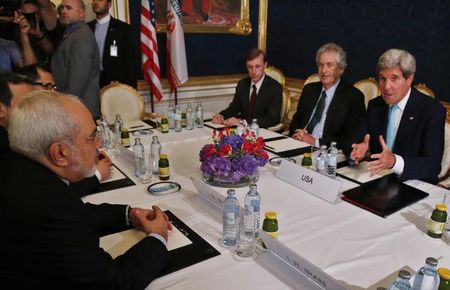By Fredrik Dahl VIENNA (Reuters) - Iran has started taking action to comply with the terms of an extended agreement with six world powers over its disputed atomic activities, a U.N. nuclear watchdog report obtained by Reuters on Wednesday showed.
The findings in a monthly update by the International Atomic Energy Agency - though no major surprise - may be seen as positive by the West ahead of the expected resumption next month of negotiations on ending the decade-old nuclear dispute.
The IAEA document made clear that Iran is continuing to meet its commitments under the interim accord that it reached with the United States, France, Germany, Britain, China and Russia late last year and that took effect in January.
In addition, as agreed when the deal was extended by four months in July, it has begun using some of its higher-grade enriched uranium to produce fuel - a step that experts say would make it more difficult to use the material for any bombs.
The IAEA is tasked with checking that Iran is living up to its part of the agreement, which was designed to buy time for talks on a comprehensive settlement of the standoff that would dispel fears of a new Middle East war.
Iran denies Western allegations that it has been working to develop a capability to make atomic bombs, saying it is refining uranium to fuel a planned network of nuclear power plants.
After years of escalating tension between Iran and the West, the election in mid-2013 of Hassan Rouhani, a pragmatist, as Iranian president on a platform of ending Tehran's international isolation created new room for diplomacy that ultimately led to last year's breakthrough nuclear deal.
The initial aim was for Iran and the six powers to reach a long-term agreement by a self-imposed July 20 deadline.
But the talks and the interim deal were extended until Nov. 24 in view of persistently wide differences over the permissible future scope of Iran's uranium enrichment program, activity which can have both civilian and military purposes.
"BIG STEP FORWARD"
Under the preliminary accord, Iran halted its most contested nuclear work - enrichment of uranium to a higher fissile concentration of 20 percent - in exchange for a limited easing of sanctions that are hurting its oil-dependent economy. It also converted its stockpile of the material into oxide from gas.
Over the four months of the deal's extension, Iran is to receive $2.8 billion in previously frozen oil revenue held in banks abroad, in addition to the $4.2 billion it got during the January-July period.
In exchange, it agreed to take some additional nuclear steps, including making nuclear fuel for a research reactor and diluting a large amount of low-enriched uranium.
Wednesday's IAEA report said Iran over the last month had used about 3.5 kg of its 20 percent uranium in oxide form for manufacturing fuel. It also told the IAEA it would dilute more than four tonnes of uranium gas enriched to about two percent.
A senior U.S. official last month described Iran's new commitments under the extended deal as a "big step forward".
Uranium can be used for atomic energy plants, Iran's stated aim, but can also provide material for bombs if processed to a high degree, which the West fears may be the ultimate aim.

The Vienna-based IAEA has inspectors on the ground in Iran who are monitoring its enrichment sites on a daily basis. Its monthly reports on the implementation of the nuclear agreement are issued to its member states and not made public.
(Editing by Mark Heinrich)
